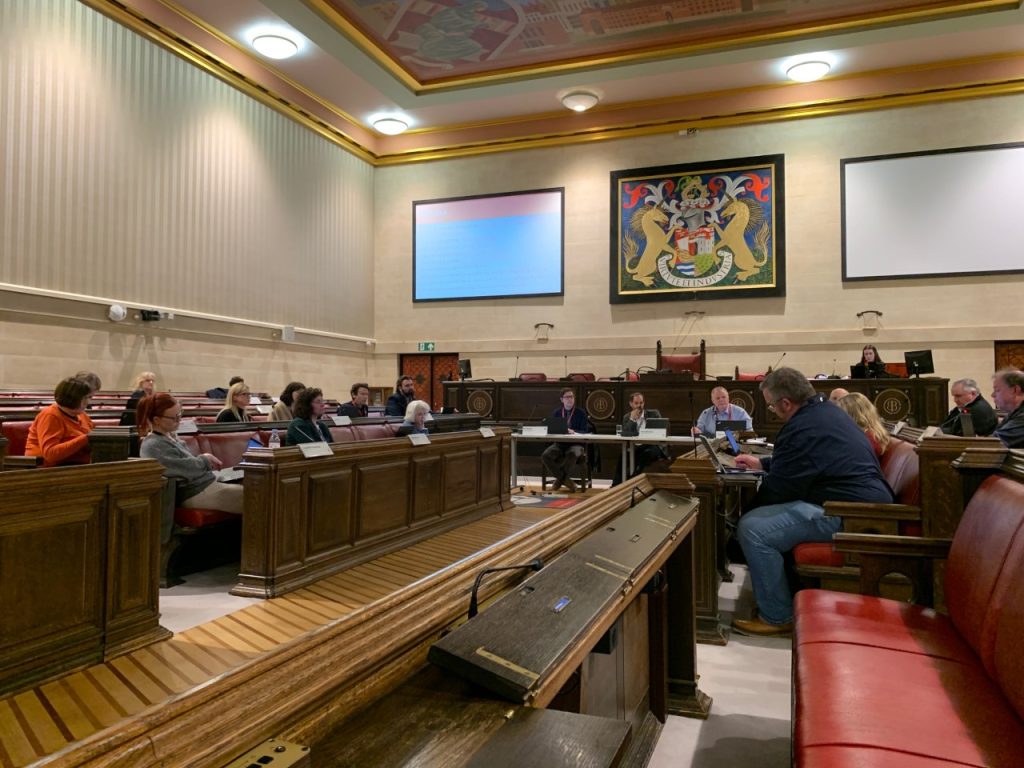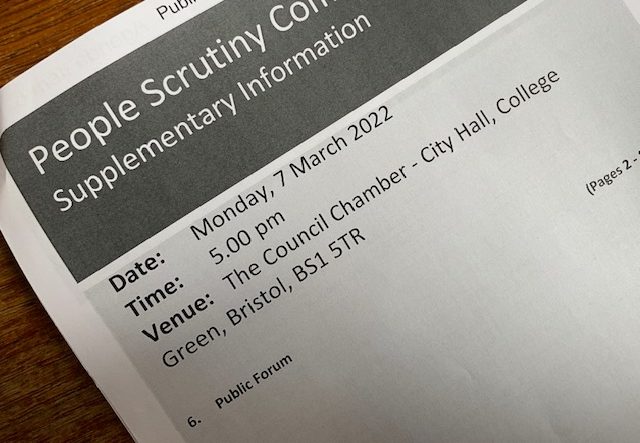Cross Party Concern Raised over Bristol EHCP Crisis
- Bristol EHCP Crisis continues with unlawful lateness and families stuck in a ‘nightmare’ system
Bristol is facing a fresh crisis in provision for children and young people with Special Educational Needs and Disabilities (Send). New figures released this week by Bristol City Council, shows a backlog of hundreds of families waiting in the Education Health Care Plan (EHCP) system.
It’s been branded an ‘absolute nightmare’ for the city’s families by Conservative Councillor for Henbury and Brenty Mark Weston, at People Scrutiny Commission this week.
Labour councillor for Hartcliffe and Withywood Kerry Bailes, described the wait for specialist school places as ‘total and utter chaos.’
The cross party concern also saw Green councillor for Southville Christine Townsend, pull the council up on their use of terminology over place planning and transparency around accountability.
And, People Scrutiny Commission chair Liberal Democrat councillor for Hengrove and Whitchurch Park Tim Kent said it was ‘not acceptable’.
Send is a crisis that has plagued Bristol across administrations after Local Authority (LA) and political failure to get to grips with the 2014 Send reforms, has left pupils without the support they need and even school places for many years.
A Public Forum question to People Scrutiny Commission, from a Bristol resident revealed a total of 71 Education Health Care Needs Assessments (EHCNA) refused between January and December 2021. An EHCNA is sent to an LA to request an assessment of a child’s Send either by the parent or carer or by a school.
A further 49 children were refused a plan after this assessment. And, 461 are still stuck in a system that should only be taking 20 weeks in total.
In an update by the Director of Education Alison Hurley during the meeting, councillors were told: “There has been improvements since 2019, but we’re not where it needs to be or where we would want it to be as a council. This is an area that has been impacted by Covid, including staff shortages and including increased demand in the system.
“So waiting times overall have reduced and there are families that have had positive experiences. But there’s still a lot to do to ensure all families receive a more efficient service.
“Quality of EHCPs is also improving and we have had that feedback from some of our families and we continue to build on this with the Time for Change project, which has been coproduced with our young people with our families and we put children and young people’s voices at the heart of that process .”
Hurley also said that the council is widening their partnership work to ensure they are hearing from a ‘range of communities’ in Bristol as part of their co-production and participation.
Covering the health aspect of EHCPs, Head of Children’s Services at Sirona, Gerry Bates said that since the Written Statement of Action (WSoA) was issued, there had been ‘improvements’ in waiting times, including for therapies and to see community paediatricians, although they know that ‘challenges remain’ on the waiting list for assessments.
Bates said that referrals to all their community health services has increased over the last year. According to Sirona’s data, there has been a 38 per cent increase in referrals to community paediatrics during 2020/2021 and referrals for autism assessments has increased by 160 per cent.
She said they also recognised that the numbers of children waiting for a follow up appointment or therapeutic intervention had increased.
Bates explained how they prioritsed children during referrals saying that it was done according to a child’s clinical presentation saying: “What they present in the clinic and make a decision about which children need to be seen first. The types of children we are prioritising are the little children, the little ones with complex neurodisability and we’re prioritising our statutory work, so that’s the EHC Needs Assessment our contribution to safeguarding children in care, children who are on controlled medication where that medication needs to be reviewed.”
She added that they are ‘struggling to recruit’ for a number of current vacant posts which ‘isn’t easy’ and thinking ‘creatively’ at who else can be delivering ‘aspects of those pathways’ such as specialist nursing and therapies to support the community paediatric workforce.
The Clinical Commissioning Group has also awarded short-term funding for 2022 to try and reduce the ‘backlogs’ which will see an additional 1000 children receive therapeutic Occupational Therapy and Speech and Language support.
Sirona are also looking at the system to see how they can move some of their resource and support for children much earlier on for needs-based support rather than the focus being on diagnosis.
Hurley added that the WSoA formally finishes in July 2022, with the council ‘in the process’ of developing a Send Partnership Plan.
Continuing: “This will be our improvement plan going forwards. It will be much wider than the Written Statement of Action. So the Written Statement of Action only responded to the areas in relation to the outcome of the inspection. This is much broader. So what we’ve also got in this report are the different elements themes of that plan and what needs to be developed and improved underneath that as we move forward over the coming years. “
Councillor Tim Kent raised concerns that the current backlog is ‘greater’ that it was three years ago. He asked why action was not taken sooner to resolve it.
Kent said ‘his worry’ was that at 500, it was probably the highest they had ever seen and that it was ‘comparable if not higher than three years ago’.
He said: “It really doesn’t seem to be acceptable. We knew there was increased demand.” He asked why ‘action was not taken sooner to resolve it.’
Hurley said the ‘performance’ this year had been affected by a combination of Covid, staffing shortages and ‘increased demand in the system’ alongside ‘periods where schools and settings were closed’.
Continuing: “Given the staffing shortages that we had in the team over the coming months at the same time we had that spike in terms of numbers of requests, that built the backlog up quite quickly then. So we are holding quite a high backlog.”
“In terms of how we are prioritising is why our timeliness, our statistics remain lower than we would want is because we are still taking a very ethical approach in terms of the number of new referrals that we have compared to the number of the backlog.”
Hurley said the council was coming at the backlog from ‘both ends’ to make sure they were not just prioristing those within timescale to get our statistics higher and that ‘legacy’ cases were also being targeted as well.
Adding: “But certainly the performance this year has been a combination of Covid, a combination of staffing shortages and obviously increased demand in the system alongside periods where schools and settings are closed, so actually being able to undertake those assessments have been challenging this year.”
Principal Educational Psychologist at Bristol City Council, Vikki Jervis said: “The number of live cases is around 500 now and by live cases we mean those that are in the system. So we don’t really classify them as backlog, it’s around the number of live cases that we’re dealing and managing with.’
She added that over the course of the same year the DfE carried out a round of national surveys looking at the impact of Covid on SEND and educational psychology services suggesting that the ‘various things Alison [Hurley] outlined, that there had been an ‘impact and reduction nationally.’
Kent said: “My worry there was 500. That’s probably the highest number we’ve seen. Certainly it’s comparable, if not higher to about three weeks ago.”
Hurley said that that after liaising with the DfE about an approach which ‘prioritised’ a portion of new cases coming in, the council was ‘improving the system as well as attacking those legacy cases.’ Hurley confirmed they were working on 60 per cent of the ‘legacy’ cases compared to 40 per cent of new cases coming through. This is because 40 per cent is the statistic they are currently trying to hit on timeliness.
Councillor Weston said he was ‘not particularly thrilled’. He said that although he understood the logic, it meant that families were being trapped in the system for a year whilst other cases coming in were being prioritised. “You’re continuing the hell that they’re going through and those that just started the process will get responded to quicker. That seems to be counter logical. Surely it’s try and clear the absolute nightmare that parents have been going through for months and months and months or sometimes years. I’m not sure I share that view of ethics .”
Hurley replied: “What we need to do is make sure that we’re are trying to improve the system as well as responding obviously to the historical situations. So that is one of the reasons. We also have children and young people that come in that are priority that need to be responded to if they have life-limiting conditions, they’re a child in care, so there are children and young people that need to be accelerated in terms of that process as well. It’s a combination. It’s a kind of detailed triage system if you like. As I say it is approved by the Department for Education, in terms of improving the system as we are at now as well as tackling the backlog.”
Weston asked for a ‘complete breakdown of what that triage system looks like.’ He said that he understood the need to prioritise life-limiting conditions but expressed concern at parents who were locked into a cycle lasting ‘months and months and months’.
Councillor Kerry Bailes expressed concern that it seemed like the council was short of ‘a lot’ of school places, with children stuck in schools with ‘unmet needs’ saying it seemed like ‘total and utter chaos’.
Hurley said that the specialist provision project aimed to deliver 450 places in the next two years. A total of 287 places are ‘guaranteed to be delivered’. This includes those to be delivered as part of phase two, meaning they are ‘almost confirmed or just about to be confirmed.’
This leaves 163 places that will need to be planned and delivered as part of the second phase – which was described as an ‘active piece of work that is happening’ and will take place over the next year and a half. Hurley described it as ‘not an exact science’ as to the numbers that will be developed in each of the years. Having initially focused on smaller projects, the full 450 will be delivered across the city by 2023.
Councillor Christine Townsend raised concerns about these 450 place in three years considering the announcement had been made 9 months ago. She said ‘we need to see the action plan in terms of when the council plans to deliver those, how they’ll be delivered, where are they and what’s next. Where are we in terms of being on target?’
Hurley said they would take on board the point raised around the terminology covering the time period, saying they would be more explicit in terms of the time frame for delivery.
Bristol Send campaigner Sally Kent, later raised concerns on Twitter about the nature of the backlog, asking if this was ‘strategic’.
‘Bristol has 25 EPs why can’t they process 1000 EHCNAs per year to get on top of the backlog? The issue here isn’t lack of EPs… is this is a strategic backlog? These questions however uncomfortable need to be asked. Bristol SEND makes no sense,’ she posted.
She raised the issue on Twitter with Deputy Mayor and Cabinet lead for Children, Education and Equalities who had not been at the People Scrutiny Commission meeting that evening.
More from Chopsy Bristol
Find us on Twitter: https://twitter.com/ChopsyBristol



